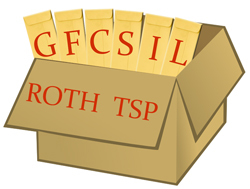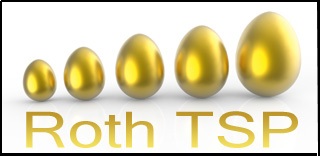![]()
To Roth TSP or Not to Roth TSP?
The decision to fund a Roth account, such as Roth TSP, instead of a traditional tax-advantaged account is an important one. When weighing your options, consider these three questions:
ARE YOU PLANNING TO RETIRE YOUNG?

Federal employees who plan to retire at a younger age, as many Special Provisions employees do, may want to fund a Roth IRA because these accounts give you access to tax-free cash earlier. You can roll your Roth TSP into a Roth IRA and access your basis. Remember the pro rata rules, which will still apply to your TSP accounts. Special Provisions employees should visit the Retirement Benefits Institute website for case studies.
WILL REQUIRED MINIMUM DISTRIBUTIONS FORCE YOU TO TAKE MONEY YOU DON’T NEED?
You cannot park your money in the TSP or a traditional IRA forever. These accounts force you to take required minimum distributions (RMDs). Even your Roth TSP has RMDs that apply when you reach seventy and a half years of age. The first-year RMD requirement is about 3.7 percent of your total TSP and IRA balances. Failing to take your full RMD will result in a penalty of 50 percent of the amount that you should have withdrawn, plus the tax bill.
If you do not actually need this money but are forced to make an RMD anyway, you will have no choice but to place the funds into taxable accounts. Doing this may force you to start paying taxes on the earnings each year.
If you will have sufficient retirement income without having to withdraw funds from your TSP, you should consider a Roth IRA in order to avoid RMDs. This way you can avoid paying taxes on unneeded withdrawals, remain in control of your tax-bracket planning, and avoid withdrawing assets you might prefer to leave to your surviving spouse, as a legacy for your heirs, or to other charitable causes.
DO YOU HAVE A LONG WINDOW OF TIME BEFORE YOU WILL START TAKING DISTRIBUTIONS FROM YOUR RETIREMENT ACCOUNTS?

You should consider both your current and future tax brackets, as well as what potential effects Social Security taxation will have in the future. Those who feel their taxes will not be lower in retirement should look seriously at the advantages of a Roth. If your tax bracket is the same in retirement as it is now, you will pay less tax on a Roth account than a traditional account if the account grows in value (and we always hope our savings accounts do!) because Roth accounts shield your investment earnings from taxation. Allowing your money to grow in a tax-free vehicle over a long period of time can create substantial wealth.
In short, federal employees should strongly consider a Roth unless they have specific reasons not to, such as confirmation that their tax bracket really will be lower in retirement.
The rules governing Roth accounts are complex. You must meet various requirements in order to be sure that your withdrawals and gains are tax- and penalty-free. We encourage you to leave a comment to ask us a question or to learn more information or ask about your own situation.
Brandon Christy is part of the GovLoop Featured Blogger program, where we feature blog posts by government voices from all across the country (and world!). To see more Featured Blogger posts, click here.





Leave a Reply
You must be logged in to post a comment.